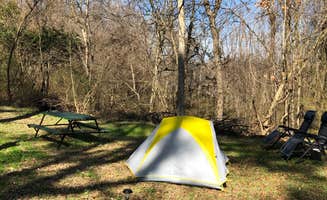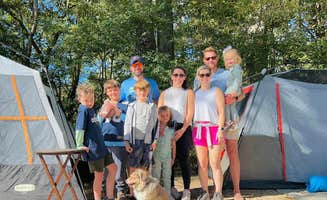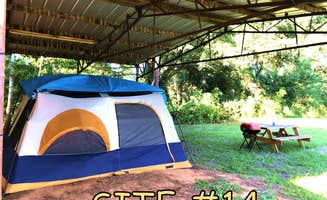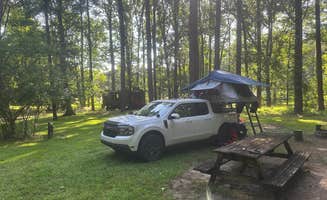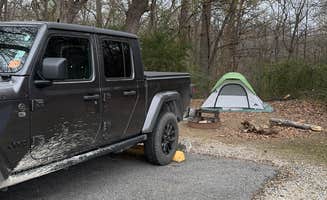Delta National Forest dominates the camping landscape surrounding Rolling Fork, Mississippi, with elevations ranging from 75 to 95 feet above sea level. The forest's low-lying wetland terrain creates a distinct ecosystem where seasonal flooding impacts campsite accessibility, particularly after rainfall events. During summer months, temperatures routinely exceed 90°F with humidity levels above 80%, creating challenging conditions for unprepared campers.
What to do
Fishing opportunities: Multiple lakes throughout Delta National Forest offer fishing access for small watercraft. At Leroy Percy State Park Campground, "we brought our kayaks and got some fishing done in alligator lake but only after playing an 18 hole disc golf course!" reports one camper.
Disc golf: The 18-hole course at Leroy Percy State Park provides recreational options beyond water activities. A visitor noted it's "a nice disc golf course" that makes for a good activity between fishing sessions.
Kayaking: The cypress-studded waterways create ideal paddling conditions. At Fish Lake Campground, "There is a beautiful, peaceful cypress water area with cypress stumps and wonderful trees," making it ideal for exploring by small watercraft.
Wildlife viewing: The wetland environment supports diverse wildlife observation opportunities. One camper at Blue Lake reported, "Saw an alligator lounging around in the lake. Beautiful nature sounds."
What campers like
Primitive camping experience: The undeveloped nature of forest sites appeals to those seeking solitude. At Delta National Forest - Barge Lake Campground, a camper noted "If you love primitive campsites you will love this. We are very partial to primitive sites that are amazing."
Cypress tree landscapes: The distinctive wetland flora creates unique scenery. "There is an opening onto a bayou with a small boat launch. Beautiful cypress trees," reports a visitor to Barge Lake.
Spacious, well-maintained sites: At Poverty Point Reservoir State Park Campground, approximately 50 miles southwest of Rolling Fork, campers appreciate the "Big sites. Well maintained. Beautiful" campground conditions.
Cabin accommodations: For those seeking more comfort, cabins provide alternative lodging. At Leroy Percy State Park, a visitor shared, "Stayed in a cabin which had everything we needed. Very relaxing. Beautiful setting. Got awesome sunrise photos. Woodpeckers very active in the morning."
What you should know
Reservation requirements: Most Delta National Forest sites require advance booking. For Delta National Forest Site 45/45A, "Reservations only 877-444-6777 or recreation.gov... I know this is primitive but remember you MUST HAVE RESERVATIONS AND HAVE PAID FOR SITE."
Limited amenities: Expect basic facilities at most forest campgrounds. At Blue Lake, "This recreation area has a typical national forest vault toilet (not chem toilet). There is no drinking water."
Road conditions: Forest access roads can become challenging, especially after rain. A visitor to Delta National Forest noted, "If it has rained you need to be aware that the site could be muddy."
Insect considerations: Mosquitoes are prevalent, particularly in summer months. One camper at Delta National Forest Site 45/45A reported, "I would guess that during the season you can make a meal out of the mosquitoes or I would guess they will make a meal of you."
Tips for camping with families
Wildlife safety: Take appropriate precautions with children near water bodies. At Leroy Percy State Park, a visitor cautioned, "Cabins are close to the bayou. Would be very cautious with children."
Insect protection: Pack effective mosquito repellent systems. At Blue Lake, "Insects were not too bad; we used a Thermocell insect repellent device which seemed to work."
Food storage considerations: Proper storage protects against wildlife encounters. A camper at Delta National Forest Site 45/45A advised, "Food storage needs to be taken serious because of bear and wildlife in the forest."
Alternative activities: Consider nearby attractions for day trips. The UNESCO World Heritage site near Poverty Point Reservoir State Park is "less than a 20min drive" according to one visitor.
Tips from RVers
Limited hookup availability: Most forest sites lack electrical and water connections. At Cypress Bend RV Park, "Sites: 6 with water and electric hookups" are available for those needing connections.
Road access challenges: Forest service roads may restrict larger RVs. One camper at Blue Lake noted, "Two wheel drive passenger cars should make it okay when the road is mostly dry."
Power alternatives: Solar panels may have limited effectiveness in heavily forested areas. A visitor to Fish Lake Campground observed, "No sun so solar will not work. If you need power bring your generator."
Supply preparation: Limited services nearby require comprehensive planning. "Make sure to bring in your supplies because you will not want to leave," advises a Barge Lake camper.


